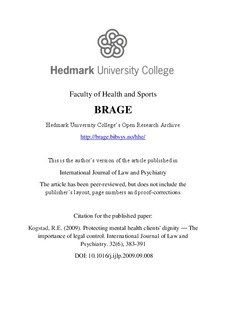Protecting mental health clients' dignity — The importance of legal control
Journal article, Peer reviewed
Permanent lenke
http://hdl.handle.net/11250/134224Utgivelsesdato
2009Metadata
Vis full innførselSamlinger
Originalversjon
Kogstad, R.E. (2009). Protecting mental health clients' dignity — The importance of legal control. International Journal of Law and Psychiatry. 32(6), 383-391 http://dx.doi.org/10.1016/j.ijlp.2009.09.008Sammendrag
Protecting human beings' dignity is a fundamental value underlying the UN's Universal Declaration of Human Rights as well as several recommendations and conventions derived from this, among them the European Convention of Human Rights (ECHR), a declaration that also takes precedence over Norwegian legislation. Still, clients' stories inform us that their dignity is not always protected in the mental health service systems.
The aim of the study has been to investigate violations of dignity considered from the clients' points of view, and to suggest actions that may ensure that practice is brought in line with human rights values.
The method used has been a qualitative content analysis of 335 client narratives.
The conclusion is that mental health clients experience infringements that cannot be explained without reference to their status as clients in a system which, based on judgments from medical experts, has a legitimate right to ignore clients' voices as well as their fundamental human rights. The main focus of this discussion is the role of the ECHR and the European Court of Human Rights as instruments for protecting mental health clients' human rights. To bring about changes, recommendations and practices should be harmonized with the new UN Convention on the Rights of Persons with Disabilities (2006). Under this convention, the European Court of Human Rights has support for the application of the ECHR without exemptions for special groups of people.
Beskrivelse
The original publication is available at: http://dx.doi.org/10.1016/j.ijlp.2009.09.008
